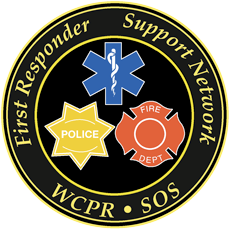First Responders
Table of Contents:
If you are in crisis:
- CopLine is an international, confidential hotline answered by experienced, retired police officers who know what it’s like to be in the line of duty. If you’re an officer struggling with work, or life, call us. You aren’t alone. You have someone to talk to.Call 1-800-COPLINE
- Contact P.I.S.T.L.E. at https://www.pistle.org/
- Contact Blue Help at https://bluehelp.org/ or
Who We Are:
I have experience working alongside Police and Firefighters on crisis teams with Phoenix and Chandler. I am able to take HB2502 (Craig Tiger Act) funding, so there is no out of pocket cost to you.
I was honored to share my skills in trauma work in 2018 and 2019 by volunteering with West Coast Post Trauma Retreat (click for more info).
When selecting a counselor, look for someone who has been trained specifically in the treatment of trauma in First Responders. We have extensive training in the special needs of this population and how these jobs impact physical, emotional and psychological functioning, as well family systems.
EMDR and other approaches will look different for first responders than for the civilian population. Someone who understands the culture, stressors of the job, and how it can impact your families is a critical part of successful therapy.
National studies have found that 37% (or higher) of firefighters and 30% (or higher) of Police officers meet criteria for PTSD, as compared to 3% of the civilian average.
First responders regularly suppress the brain’s automatic response system of fight/ flight or freeze/collapse. They literally “run in” while everyone else is “running out” of a dangerous situation. Shift work, being awakened by “tones,” and repeated first-hand exposure to dangerous, stressful, and traumatic events can cause cumulative damage to the nervous system and create thousands of unprocessed memories. This can result in “flashbacks” that look very different for a first responder than a civilian.
First responders “have to minimize the psychological and physical dangers of the job in order to be able to do it” (Adler-Tapia). This is done with defense mechanisms like compartmentalization and dissociation, which work great on the job, but not so well in personal lives. A counselor who understands the balance is important.
East Valley Trauma counseling does NOT do Fit For Duty Evals, Return to Work Evals, Independent Medical Examinations (IMEs), Medical Retirement Evaluations, or any other assessments your department may request of you that would create a conflict of interest between helping YOU versus helping your CITY/ DEPARTMENT.
What Will Therapy Look Like?
We are not doctors, we do not prescribe medications or do assessments of any kind. We are not here to diagnose you, and we do not share your information, progress notes, or our treatment information with anyone.
When you come to session, we will teach you about First Responder Exhaustion Syndrome, how to care for your nervous system, skills for calming your body and mind, and how to communicate with friends and family who may not understand the things you’ve experienced. Traumatic memories (sounds, smells, sensations in the body) are like cookies backed up in a computer that require “dumping” and interventions we’ve been trained in help you do exactly this. These are the things that make you feel “irritable” or on edge, even if you are not experiencing flashbacks.
We don’t have to talk extensively about childhood, describe the critical calls, or spend months/ years “on the couch.” In fact, you don’t really even have to talk. Your brain knows how to heal and we can help. If you’re coming in for a bi-annual wellness session, we can have an informal chat- nothing goes back to your department except confirmation of the date and time you came in.
- Fit for duty evaluations
- Return to work evaluations
- Independent Medical Examinations (IMEs)
- Medical Disability / Retirement evaluations
- Any other assessments your department may request of you that would create a conflict of interest between helping you versus helping your city or department.
WEAPONS
YOUR PRIVACY
- If you pursue a medical retirement or workman’s comp claim. In most instances, your records are requested and become part of your case.
- If you are investigated by IA or another entity regarding your performance on the job, we are required to turn over your records under the Patriot Act IF asked to do so, and are also required by law to not tell you this request was made.
- If we receive a subpoena from a judge, we will fight to keep your records private. However, if a judge court orders your records, we are compelled to comply.
What is Emergency Responder Exhaustion Syndrome?
The following is quoted from “Emergency Responder Exhaustion Syndrome (ERES): A perspective on stress, coping and treatment in the emergency responder milieu” by Fay, J. PsyD, Kamena, M. D PhD, Benner, A. PhD, Buscho, A. PhD & Nagle, D.
Key Characteristics of ERES
The key characteristics of ERES are depression, isolation, and physical and emotional exhaustion.
Depression
Isolation
Exhaustion
What is HB 2502 / Craig Tiger Act?
https://www.azleg.gov/ars/38/00672.htm
https://www.azleg.gov/ars/38/00673.htm
Peace officers and firefighters who are exposed to any one of the following events while in the course of duty (must be provided with) up to twelve visits of licensed counseling, which may be provided through telehealth, paid for by the employer:
- Visually witnessing the death or maiming or visually witnessing the immediate aftermath of such a death or maiming of one or more human beings.
- Responding to or being directly involved in a criminal investigation of an offense involving a dangerous crime against children as defined in section 13-705.
- Requiring rescue in the line of duty where one’s life was endangered.
- Using deadly force or being subjected to deadly force in the line of duty, regardless of whether the peace officer or firefighter was physically injured.
- Witnessing the death of another peace officer or firefighter while engaged in the line of duty.
- Responding to or being directly involved in an investigation regarding the drowning or near drowning of a child.
In addition to providing paid time off and counseling services, peace officers and firefighters may also take up to 30 paid calendar days off to engage in treatment.
Common Psychological Defense Mechanisms used by 1st Responders include:
STOICISM
DEPERSONALIZATION
DEREALIZATION
For many, symptoms can be undetectable – sometimes presenting as only recurring headaches and sleep disturbance, a sense of irritability, or feeling detached.
Habitual use of these defenses can result in delayed PTSD (Adler-Tapia), which can lie dormant for years until any trigger (overt or innocuous) is encountered and suddenly, symptoms are noticed.
Betrayal trauma describes a situation in which the city, department, fellow workers, or family members did not support the individual who is exhibiting symptoms.
Due to the ongoing nature of a first responder’s job, “pinpointing” the exact traumatic even that “caused PTSD” can be difficult, if not impossible. Working with somebody who understands this and the cumulative effects of daily exposure to shootings, fire, deaths, accidents, domestic violence, and other disruptions is important in choosing a counselor.
Data from the University of Phoenix shows that only 39 percent of first responders with PTSD sought help because many fear negative repercussions. Your information is confidential.
We encourage (but do not require) family sessions in our work to help spouses and/ or children understand the nature of the injury to the nervous system and how they can be supportive.
For peer support, resources, advocacy and training for LEO, please visit P.I.S.T.L.E. : A peer support group run by cops for cops.
Spouses of First Responders may benefit from reading the following books:
“I Love a Cop: What Police families need to know” by Ellen Kirschman
“I Love a Fire Fighter: What the family needs to know” by Ellen Kirschman
“Emotional survival for law enforcement: A guide for officers and their families” by Kevin M. Gilmartin
SESSIONS MAY BE COVERED AT NO COST THROUGH THE FOLLOWING RESOURCES:
100 Club can assist with active and newly retired public safety
602-485-0100 https://www.100club.org/
For HB2502 Services:
City of Chandler
Police:
Or Contact a member of your Peer Support
Fire:
Chris Jarosik Christine.jarosik@chandleraz.gov
Or Contact a member of your Peer Support
Town of Gilbert
Police:
McKay Lauritzen (McKay.Lauritzen@gilbertaz.gov)
Candice Roman (Candice,Roman@gilbertaz.gov)
Sgt. Mark Worden mark.worden@gilbertaz.gov
Fire:
Jodi Spargo Jodi.Spargo@gilbertaz.gov
City of Mesa
Fire: Bryan Sockrider Bryan.Sockrider@mesaaz.gov
Police: Sgt. Adam Goulet Adam.Goulet@mesaaz.gov
Or any member of the Peer Support Team
City of Tempe
Brad Hollingsworth Brad_Hollingsworth@tempe.gov
Heather Estrada Heather_Estrada@tempe.gov
Or any member of your peer support
City of Phoenix
Please provide us with the following and we will get your authorization set up through Compsych
Full name
Position
City of employment
Type of qualifying event (child drowning, adult vehicle fatality, etc)
Date of the event
City of Scottsdale
Please contact Public Safety Crisis Solutions
Brian French 602-466-9456, Brian@pscrisissolutions.com or visit www.pscrisissolutions
All other cities:
Please contact your peer support or admin




